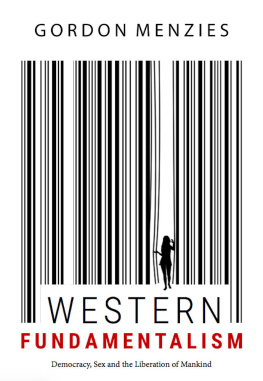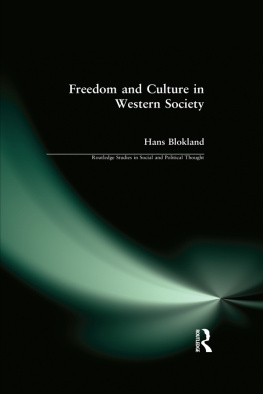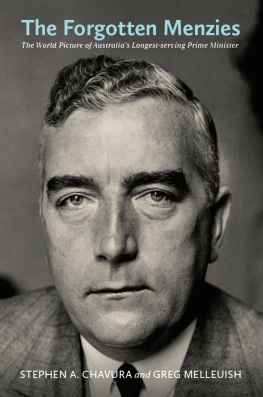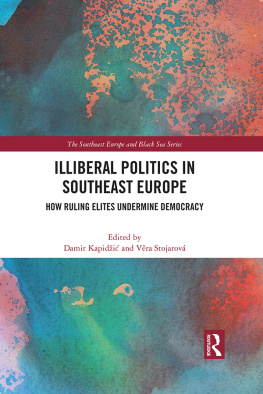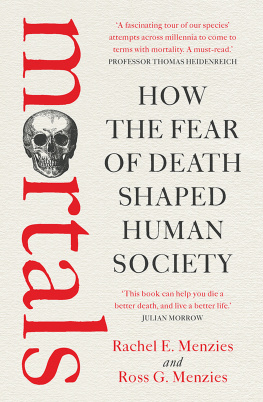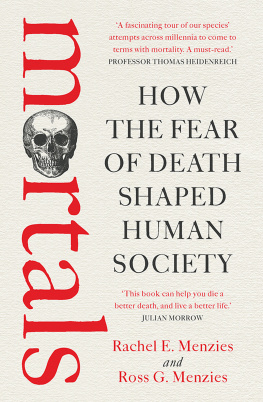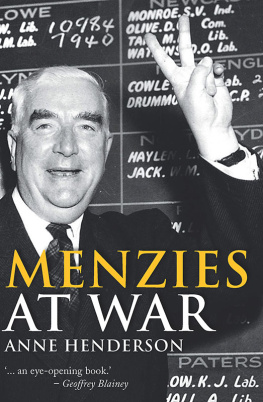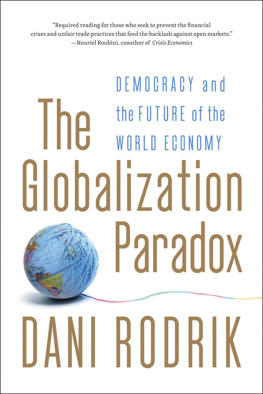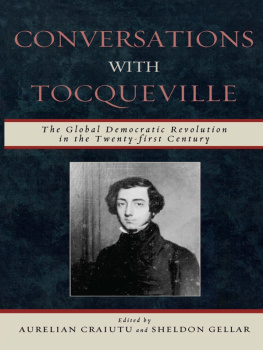Western
Fundamentalism
Copyright 2020 by Gordon Menzies
All rights reserved. No part of this publication may be reproduced, distributed, or transmitted in any form or by any means, including photocopying, recording, or other electronic or mechanical methods, without the prior written permission of Gordon Menzies except in the case of brief quotations embodied in critical reviews and certain other noncommercial uses permitted by copyright law.
A catalogue record for this book is available from the National Library of Australia
www.westernfundamentalism.com
Menzies, Gordon (author)
Western Fundamentalism: Democracy, Sex and the Liberation of Mankind
ISBN 978-0-6487285-1-1
Culture / Economics / Politic s
Editors: Rachel D oran, Jamey Foxton & Krista Wood
Cover illustration by Green Hill Publishing
C over design by Jamey Foxton & Gordon Menzies
llustrations: Tim Andrews, Jamey Foxton & Gordon Menzies
Contents
.
Foreword
It is a cruel trick of human nature that we decry faults in other people that we ourselves display in a more exaggerated form. As Jesus once put it, How can you say to your brother, Let me take the speck out of your eye, when all the time there is a plank in your own eye?. How galling to tolerant, liberal-minded Westerners, then, so quick to label others with firm convictions as fundamentalist, to see the plank of fundamentalism jutting out from their own eyes in the mirror of this intriguing book?
I have known Gordon Menzies for nearly two decades. He is a wonderful teacher, who has the teachers gift of helping you see for yourself the implications of the things you say, while all the time appearing only to be asking innocent questions. No doubt his years as a tutor at Oxford University helped him to perfect his art but there is also something of the playful tease baked into the man. All of this and more is on display in this book. A mark of how much Gordon has poured of himself into his work is that you hear his voice almost eerily on every page. To spend time reading this engaging book is to spend an evening in Gordons company, having your views gently prodded and turned over, ever so politely, but often with a wry smile and a raised eyebrow. Is that what you really believe? Then let me ask you to consider this question
G ordon and I share a profession and a faith. As Christian economists, we work at the crossroads of love and money. Our Christian faith teaches us clearly which of these is the greater force for good in human affairs but our profession teaches us that the lesser can still be a good servant, albeit a bad master. Our profession speaks the language of money in which everything has a price and where freedom of choice selects outcomes with the highest reward measured in monetary terms. Our faith, on the other hand, points often in a very different direction, where outcomes are valued beyond price and love is its own reward.
T he languages of love and money are both spoken in this world and misunderstandings, wilful or otherwise, between their respective speakers often lie at the heart of political and cultural conflict. Gordon explores this tension in novel and surprising ways, in a book which is not primarily about economics. Nonetheless, the basic and often unstated assumptions that Gordon labels Western fundamentalism are easily translated into the language of money. This is why they cause havoc when applied in areas where, instead, human flourishing requires the language of love where commitment, self-sacrifice and devoted service take the place of self-interested freedom of choice. Gordons analysis of the impact of Western fundamentalism in the arena of human relationships, especially sex and marriage, offers readers on the Left or Right profound and surprising even disturbing conclusions.
T here is much of Gordon Menzies the man in this book and therefore much to admire, not least his courage and candour in laying bare his personal experience of the misapplication of the two languages in his own life. Settle in for an engaging, stimulating and, for some no doubt, occasionally infuriating conversation with Gordon Menzies, even if you are shocked by the sheer size of the plank you discover sticking out of your eye!
P rofessor Ian Harper AO,
Dean of Melbourne Business School
Melbourne, February 2021
.
Why I am lucky to be writing this book
I entered this world in the 1960s, precariously, in the same decade as the sexual revolution.
M y mother, unwell and in an abusive marriage, attempted an abortion. She told me this herself, and my elder siblings have confirmed there was more than one attempt.
It happened as the entire Western world experimented with the notion there should be no restraint on individual liberty. I do not think she herself saw abortion as a political actshe was just an ordinary woman facing tragic choicesbut she was keeping in step with the times.
Fairly early on, however, I fell out of step. As a teenage convert to Christianity, I came to believe that our humanity is a gift from someone elseit has a givenness to itso I came to think my moral decisions were about more than my exercise of freedom.
My professional life was also shaped by strong currents of freedom. I became an economist at a central bank (the Reserve Bank of Australia), and briefly at the Federal Treasury. I would run computer simulations of how different policies, like deregulating the dollar, might affect the economy. The late twentieth century was an exciting time for my profession; it seemed the whole Western World, and even some of the communist world, was embracing free markets.
In wider culture, removing restrictions from everything in the pursuit of the bottom line came to be known as neoliberalism. This was a dream come true for the Chicago School of Economics, which re-imagined society as a marketplace of autonomous individuals. I had a dream come true myself around this time. My employer paid for a masters at the Australian National University. I was pleasantly surprised to receive a prize for the best student, which led in time to a Commonwealth scholarship at Oxford.
In 2003, I switched from being a central banker to an academic, where a less pleasant surprise awaited me. The 2008 Global Financial Crisis showed how damaging free markets can be in banking. In the leadup to the GFC some bankers felt free to ignore any moral limits, if the incentives were lucrative enough. The freedom of free markets ended up devouring itself. This jolted some academics at the Institute of New Economic Thinking that perhaps theres something about human nature that can corrupt markets. When I became a visiting scholar there, I came to the disquieting conclusion that if economic principles should have worked anywhere they should have worked in banking, and yet they hadnt.
I realised I had to think more deeply about the cultural impact of neoliberalism, especially the way it reduces ethics to pursuing the proverbial bottom line (which youll read about in Chapter 3). I found myself questioning the supposedly Left-wing nature of the sexual revolution. I came to see it instead as a neoliberal conquest of the West (Chapter 4) creating an arena where those possessing power or beauty can ride roughshod over others who are less fortunate. Nothing makes a Chicago economist happier than deregulation, and the sexual revolution is the most significant deregulation in the West today.
It took me a while to see that the real godfather of the Chicago School wasnt Friedman or Hayek so much as it was the German philosopher Friedrich Nietzsche. More than simply advocating for individual autonomy, he believed that the powerful and beautiful have a moral duty to mistreat the weak (Chapter 5). Nietzsches thinking creates problems for us in the West not least because his attitude to weakness was treasured in the Third Reich. It runs against a tradition we have in Western politics, which backs the value of the individual by giving all individuals an equal vote. While democracy, the topic of Chapter 2, does not automatically protect the weak, it does dignify them at election time.
Next page
